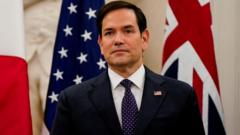The United States has officially paused all foreign aid as part of a review process initiated by President Trump's recent executive order, according to an internal memo circulated within the State Department. The memo, which has been confirmed by various media outlets, mandates a comprehensive review of existing foreign assistance programs to ensure they align with the administration's foreign policy goals, emphasizing a need for aid to make America "stronger," "safer," or "more prosperous."
As the world’s largest donor of international aid, the US allocated approximately $68 billion in 2023. The halting of new assistance includes a wide spectrum of initiatives, from vital humanitarian aid to military assistance, with notable exceptions granted to emergency food relief and military funding specifically for Israel and Egypt. This hiatus will last 90 days while officials assess the current commitments.
The memo's directive states that "No new funds shall be obligated for new awards or extensions of existing awards until reviewed and approved," further ordering immediate stop-work actions on ongoing projects. Experts and former officials express grave concerns regarding the implications of this suspension. Josh Paul, a former senior State Department official, highlighted the potentially vast impact, particularly on humanitarian efforts such as de-mining programs.
Dave Harden, who previously directed USAID missions, noted that the suspension could significantly affect a variety of crucial programs, including those providing water, sanitation, and shelter to those in dire need. While the work of implementing partners may continue, the ability to provide aid is halted under this new directive.
The funding freeze could also have ripple effects on other global situations, notably in Ukraine, where US military assistance has been pivotal under the prior administration. Rubio's memo justifies this significant change by underscoring the necessity for the new administration to ascertain the effectiveness and non-duplication of existing commitments.
This policy shift comes at a critical moment, as humanitarian aid flows into the Gaza Strip following a ceasefire between Israel and Hamas, alongside escalating hunger crises worldwide, particularly in Sudan. The memo does allow for waivers regarding specific military financing and administrative expenses, though the future of broader humanitarian initiatives remains uncertain as the US navigates this unprecedented pause.




















